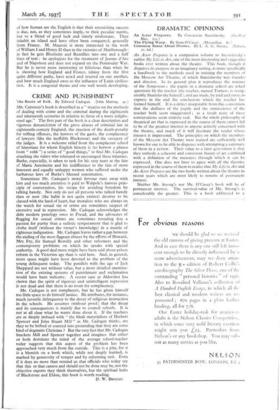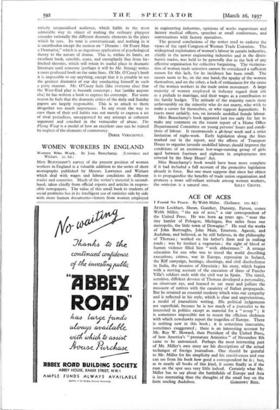DRAMATIC OPINIONS
An Actor Prepares. By Constantin Stanislaysky. (Gcoff.ey Bles. iss.)
The Flying Wasp. By Sean O'Casey. (Macmillan. 6s.) Common Sense About Drama. By L. A. G. Stron;. (Nelson. 2S. 6d.) An Actor Prepares is a companion volume to Stanislaysky's earlier My Life in Art, one of the most interesting and suggestive
books ever written about the theatre. This book, though it disguises its purpose in an imaginary setting, is more specifically a handbook to the methods used in training the members of the Moscow Art Theatre, of which Stanislaysky was founder and director. In its general plan it reproduces the manner of the Symposium ; the pupils in a dramatic school are asked questions by the teacher (the teacher, named Tortsov, is recog- nisably Stanislaysky himself), and are made, by trial and error, to express in the end the conclusions which the teacher has formed himself. It is a defect inseparable from this convention that the dullness of the pupils and the omniscience of the teacher both seem exaggerated ; as a result none of these conversations seem entirely real. But the whole philosophy of theatrical art that is expressed in the course of them cannot fait to be of the greatest interest to anyone actively concerned with the theatre, and much of it will fascinate the reader whose interest is impersonal. The principles on which the members of the Moscow Art Theatre were trained are sufficiently well known for one to be able to dispense with attempting a summary
of them in a review. Their value to a later gervm.ation is that they embody a coherent and consistent theory of art combined
with a definition of the measures through which it can be expressed. One does not have to agree with all the theories expressed in the course of them to realise that My Life in Art and An Actor Prepares are the two books written about the theatre in recent years which are most likely to remain of permanent interest.
Neither Mr. Strong's nor Mr. O'Casey's book will be of permanent interest. The survival-value of Mr. Strong's is considerably the greater. This is a book addressed to a
strictly unspecialised audience, which fulfils in the most admirable way its object of making the ordinary playgoer consider rationally the different dramatic elements in the plays which he sees. Its tone is conversational, and nothing in it is unorthodox except the section on " Dreams : Or Every Man a Dramatist," which is an ingenious application of psychological theory to the nature of drama. This is, within its limits, an excellent book, sensible, acute, and exemplarily free from far- fetched theories, which will retain its useful place in dramatic literature until someone (perhaps it will be Mr. Strong) writes a more profound book on the same lines. Of Mr. O'Casey's book it is impossible to say anything, except that it is pitiable to see the greatest dramatist of our day conducting himself in such a petty manner. Mr. O'Casey feels (like everyone else) that the West-End play is beneath contempt ; but (unlike anyone else) he has written a book to express his contempt. For some reason he feels that the dramatic critics of the daily and Sunday papers are largely responsible. This is to attach to them altogether too much importance. In any event the way to cure them of their evil habits was not merely to express a set of rival prejudices, unsupported by any attempt at coherent argument and couched in the vernacular of abuse. The Flying Wasp is a model of how an excellent case can be ruined by neglect of the elements of controversy.
DEREK VERSCHOYLE.











































 Previous page
Previous page